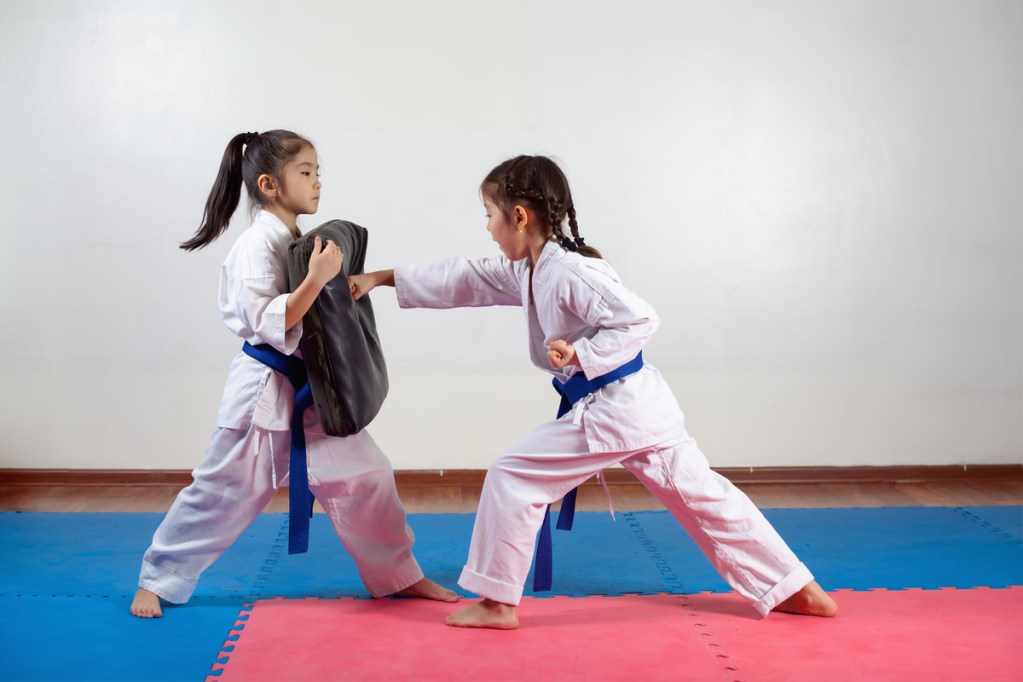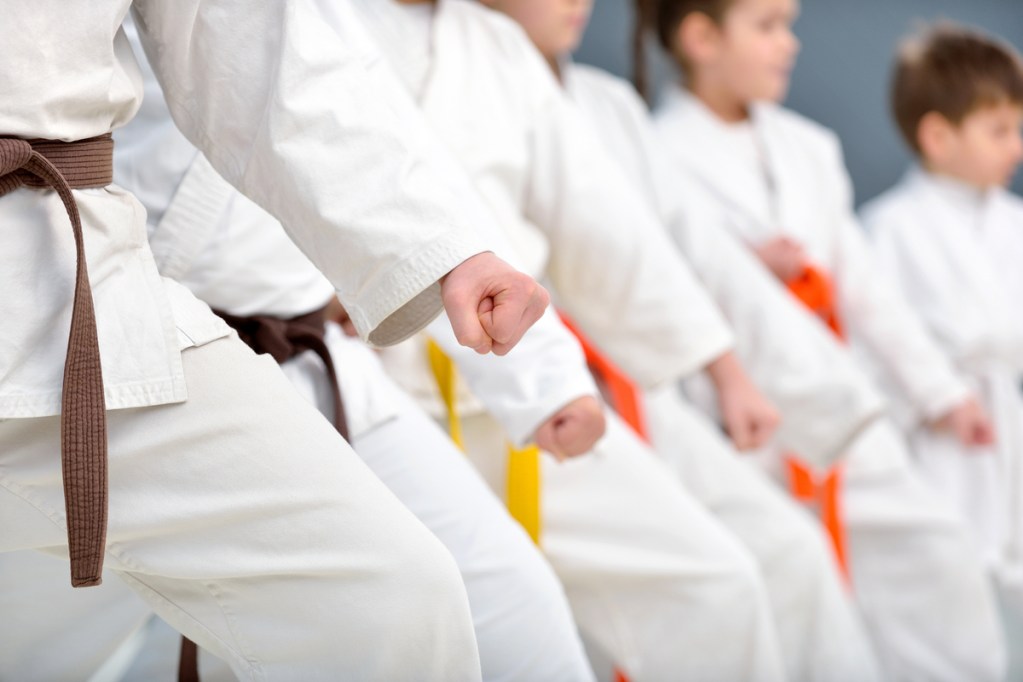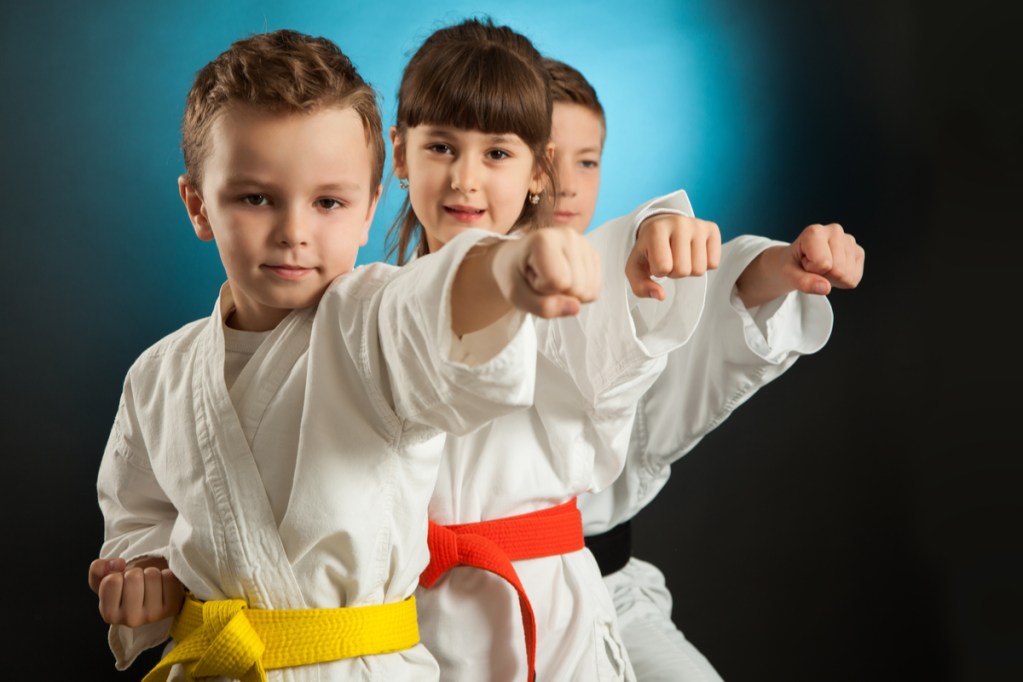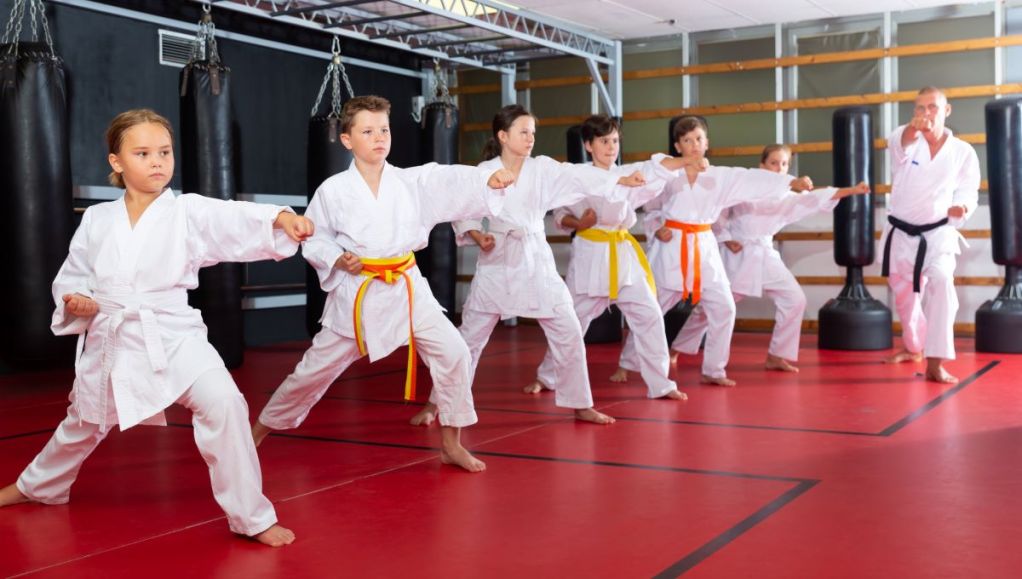
Is karate for kids a good idea? There are karate studios in just about every community across the nation and usually more than one, but should you enroll your child in a program? Karate has a long, rich history with its origin tied to the archipelago Okinawa. This popular martial art has been around for centuries and made its debut in the Tokyo Olympics in 2020.
The practice has been glorified in classic films like The Karate Kid and has been introduced to the kids in shows like Teenage Mutant Ninja Turtles and Power Rangers. While parents may not want their kids running around the house demonstrating karate moves on their siblings, it turns out karate offers children a lot of benefits, which is why enrolling your child in a karate class can be a great idea especially if your kiddo doesn’t show an interest in other sports or extracurricular activities.

The benefits of karate for kids
The Mawashi Geri or roundhouse kick, and the Ushiro, a back kick for us novices, are basic karate moves kids learn once enrolled in a karate program. Along with a list of karate techniques, children receive other pluses as they work to earn the various belt colors from white to black.
Discipline
A karate studio is a place of respect. Once students enter the karate studio for a session, they are expected to pay attention to the instructor and follow certain rules and procedures. Karate instructors do not allow talking during class and fooling around is a major no-no.
Misbehavior is corrected immediately, and karate participants quickly learn to settle down and listen. As the child moves along in a karate program, the discipline he or she must show on the mat begins to move into the classroom and the home.
Focus
Children fly from one activity to another and are notorious for their short attention spans especially now that smartphones are an extension of their hands. Karate has been shown to help children having difficulty with their focus and concentration in school.
Karate and other martial arts are often used in an overall program to help children with ADHD. Dr. John Ratey, a noted physician and author, wrote about the importance of regular exercise like karate in his book, Spark: The Revolutionary New Science of Exercise and the Brain. Ratey discusses how consistent exercise ignites the part of the brain responsible for memory and attention.
Along with discipline, karate students also learn how to focus on the mat as they pay attention and follow along with the instructor. It doesn’t take long for the focus in the karate studio to translate into better grades on the report card and improved concentration in other pursuits like music and sports.
Respect
Did you know there is such a thing as karate etiquette? Karate etiquette is what the rules and customs incorporated into martial arts are called. A karate student quickly learns to respect the atmosphere within the studio or dojo, which includes the sensei or instructor and other students. Students learn how to politely greet their sensei and opponents.
Even the act of removing shoes before coming onto the mat is a sign of respect. Karate teaches children to show respect outside of the studio as well. Parents will be thrilled to hear those pleases and thank you flow with frequency minus the prompting. Politeness will become a habit instead of a chore.
Improves self-confidence
Karate is a martial art and is not considered a traditional sport. Unlike team sports, where kids compete against one another for playing time as well as with opponents, on the karate mat, each student is taking part in an individual journey with personal milestones.
As students work through karate’s belt system, they are learning how to overcome challenges, conquer nerves, and frustration which leads to an overall improvement in self-confidence. Confidence on the mat will naturally find its way into other parts of your child’s life including the classroom, social interactions, and other activities like sports.
Benefits a child’s overall health
According to the Centers for Disease Control and Prevention, regular participation in physical exercise has multiple benefits for children. Exercise like karate improves cardiovascular health, builds muscles, and strong bones. It can help reduce stress and anxiety and alleviate depression while reducing the risk of developing health problems like diabetes and heart disease later in life.
Don’t think karate is a strenuous exercise? A Harvard Health study showed a 125-pound person burned around 600 calories after an hour-long karate class. While a child may not burn that many calories, practicing karate two or three times a week, karate for kids will improve muscle tone, core strength, balance, reflexes, and coordination.

Other positives to karate for kids
In addition to the benefits we’ve already discussed, karate offers additional pluses for the kids become involved in the discipline. Check out these other benefits to checking out one of those karate studios in your community.
- Improves posture
- Achieves goals
- Helps manage stress
- Develops hand-eye coordination
- Improves reflexes
- Builds self-esteem

Karate for kids
Even if your child loves sports, adding karate into the mix is a plus. Since karate helps improve discipline and focus, parents will often see an improvement in grades and in other pursuits like athletics, dance, cheer, music, and more. Behavior tends to improve too, which is why karate is often a component of managing ADHD. Karate has even been found to help children on the autism spectrum. The bottom line about karate for kids is that it’s a positive activity for children and teens to be involved in.
There is a common misconception that karate is about fighting. It’s not. Karate is a martial art stressing self-discipline. Of course, it can be used for self-defense, but as a parent, you’ll quickly see you won’t have to worry about your child using a roundhouse kick on a sibling. So, check out those karate studios in your area and find one that’s a good fit for your child or teen.



